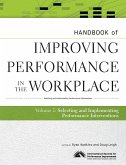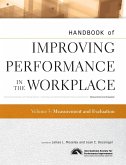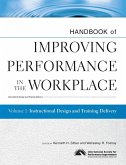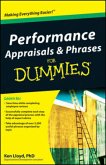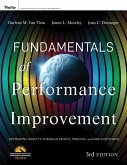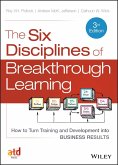Handbook of Improving Performance in the Workplace, Set
Herausgegeben von Silber, Kenneth; Foshay, Wellesley R.; Watkins, Ryan; Leigh, Doug; Moseley, James L.
Handbook of Improving Performance in the Workplace, Set
Herausgegeben von Silber, Kenneth; Foshay, Wellesley R.; Watkins, Ryan; Leigh, Doug; Moseley, James L.
- Gebundenes Buch
- Merkliste
- Auf die Merkliste
- Bewerten Bewerten
- Teilen
- Produkt teilen
- Produkterinnerung
- Produkterinnerung
The Handbook stands alone as a rigorous, evidence-based Body of Knowledge under the banner of the International Society for Performance Improvement's "performance landscape," and for the first time provides a unified and authoritative compendium of standard principles and best practices for improving productivity and performance in the workplace. Featuring best-in-field researchers, thinkers, and practitioners across several disciplines and geographic boundaries, each volume provides a current review of all information presently available for the three core areas of improving performance in…mehr
Andere Kunden interessierten sich auch für
![Handbook of Improving Performance in the Workplace, the Handbook of Selecting and Implementing Performance Interventions Handbook of Improving Performance in the Workplace, the Handbook of Selecting and Implementing Performance Interventions]() Handbook of Improving Performance in the Workplace, the Handbook of Selecting and Implementing Performance Interventions172,99 €
Handbook of Improving Performance in the Workplace, the Handbook of Selecting and Implementing Performance Interventions172,99 €![Handbook of Improving Performance in the Workplace, Measurement and Evaluation Handbook of Improving Performance in the Workplace, Measurement and Evaluation]() Handbook of Improving Performance in the Workplace, Measurement and Evaluation172,99 €
Handbook of Improving Performance in the Workplace, Measurement and Evaluation172,99 €![Handbook of Improving Performance in the Workplace, Instructional Design and Training Delivery Handbook of Improving Performance in the Workplace, Instructional Design and Training Delivery]() Kenneth H. SilberHandbook of Improving Performance in the Workplace, Instructional Design and Training Delivery172,99 €
Kenneth H. SilberHandbook of Improving Performance in the Workplace, Instructional Design and Training Delivery172,99 €![The Field Guide to the 6ds The Field Guide to the 6ds]() Andy JeffersonThe Field Guide to the 6ds69,99 €
Andy JeffersonThe Field Guide to the 6ds69,99 €![Performance Appraisals & Phrases for Dummies Performance Appraisals & Phrases for Dummies]() Ken LloydPerformance Appraisals & Phrases for Dummies16,99 €
Ken LloydPerformance Appraisals & Phrases for Dummies16,99 €![Fundamentals of Performance Improvement Fundamentals of Performance Improvement]() Darlene Van TiemFundamentals of Performance Improvement98,99 €
Darlene Van TiemFundamentals of Performance Improvement98,99 €![The Six Disciplines of Breakthrough Learning The Six Disciplines of Breakthrough Learning]() Roy V. H. PollockThe Six Disciplines of Breakthrough Learning47,99 €
Roy V. H. PollockThe Six Disciplines of Breakthrough Learning47,99 €-
-
-
The Handbook stands alone as a rigorous, evidence-based Body of Knowledge under the banner of the International Society for Performance Improvement's "performance landscape," and for the first time provides a unified and authoritative compendium of standard principles and best practices for improving productivity and performance in the workplace. Featuring best-in-field researchers, thinkers, and practitioners across several disciplines and geographic boundaries, each volume provides a current review of all information presently available for the three core areas of improving performance in the workplace: Instructional Design and Training Delivery; Intervention Selection and Implementation; and Measurement and Evaluation.
Produktdetails
- Produktdetails
- Verlag: Wiley & Sons
- 1. Auflage
- Seitenzahl: 1492
- Erscheinungstermin: 1. Dezember 2009
- Englisch
- Abmessung: 249mm x 201mm x 127mm
- Gewicht: 3817g
- ISBN-13: 9780470525432
- ISBN-10: 0470525436
- Artikelnr.: 27513243
- Herstellerkennzeichnung
- Libri GmbH
- Europaallee 1
- 36244 Bad Hersfeld
- gpsr@libri.de
- Verlag: Wiley & Sons
- 1. Auflage
- Seitenzahl: 1492
- Erscheinungstermin: 1. Dezember 2009
- Englisch
- Abmessung: 249mm x 201mm x 127mm
- Gewicht: 3817g
- ISBN-13: 9780470525432
- ISBN-10: 0470525436
- Artikelnr.: 27513243
- Herstellerkennzeichnung
- Libri GmbH
- Europaallee 1
- 36244 Bad Hersfeld
- gpsr@libri.de
Kenneth H. Silber, Ph.D., CPT, is an Associate Professor Emeritus in instructional technology at Northern Illinois University, and president of Silber Performance Consulting. Wellesley R. (Rob) Foshay, Ph.D., CPT,?is director-research for the Education Technology Group of Texas Instruments. Ryan Watkins, Ph.D. is an associate professor at the George Washington University in Washington, D.C. Doug Leigh is an associate professor of education at Pepperdine University's Graduate School of Education and Psychology. James L. Moseley, Ed.D., LPC, CHES, CPT, is an associate professor at Wayne State University's College of Education Instructional Technology Program. Joan C. Dessinger, Ed.D., CPT, is an author, consultant, editor, and educator. About ISPI.?Founded in 1962, ISPI is the leading international association dedicated to improving productivity and performance in the workplace. ISPI represents more than 10,000 international and chapter members throughout the United States, Canada, and 40 other countries. ISPI is the premier professional association dedicated to improving workplace performance and its members include trainers, instructional designers, and organization development, performance, and human resource professionals.
Volumne One: Instructional Design and Training Delivery/ISPI-1.
Introduction to Volume One.
Part One: Foundations.
1 Some Principles Underlying the Cognitive Approach to Instructional Design
(Wellesley R. Foshay).
2 A Principle-Based Model of Instructional Design (Kenneth H. Silber).
3 Origins and Evolution of Instructional Systems Design (Michael Molenda).
Part Two: Analysis.
4 Collecting Analysis Data (Jeanne Hites Anderson).
5 From Performance Analysis to Training Needs Assessment (Kerry J. Burner).
6 Behavioral Task Analysis (Herbert H. Bell, Dee H. Andrews, Wallace H.
Wulfeck II).
7 Cognitive Task Analysis (Steven W. Villachica, Deborah L. Stone).
Part Three: Instructional Strategies.
8 An Analysis of the Failure of Electronic Media and Discovery-Based
Learning: Evidence for the Performance Benefits of Guided Training Methods
(Richard E. Clark, Kenneth Yates, Sean Early, Kathrine Moulton).
9 Instructional Strategies for Receptive Learning Environments(Richard E.
Mayer, Ruth Colvin Clark).
10 Instructional Strategies for Directive Learning Environments(Ruth Colvin
Clark, Richard E. Mayer).
11 Assembling and Analyzing the Building Blocks of Problem-Based Learning
Environments (David H. Jonassen).
12 High Engagement Strategies in Simulation and Gaming (Conrad G. Bills).
13 Video Game-Based Learning: An Emerging Paradigm for Instruction (Kurt D.
Squire).
14 Training Complex Psychomotor Performance Skills: A Part-Task Approach
(Peter J. Fadde).
Part Four: Evaluation.
15 An Overview of Level Two Certification Processes (Sharon A. Shrock,
William C. Coscarelli).
16 The Role of Evaluation in Instructional Design (Steven M. Ross, Gary R.
Morrison).
Part Five: Management.
17 Managing ID/Training Development and Delivery (Deborah Singer Dobson,
Michael Singer Dobson, Ted Leemann, Kevin Forsberg).
18 Managing Relationships in the Performance Improvement Process (Jane
Ranshaw).
19 Managing ID in the Context of a Training Organization (Heather C.
Maitre, Susan A. Smith).
About the Editors.
About the Contributors.
The International Society for Performance Instruction.
Name Index.
Subject Index.
Introduction to Volume Two.
Acknowledgements.
Part One: Introduction.
1 HPT Models: An Overview of the Major Models in the Field (Frank S.
Wilmoth, Christine Prigmore, Marty Bray).
2 Linking Practice and Theory (Seung Youn Chyung, Shelley A. Berg).
3 The Performance Pyramid (John Wedman).
Part One: Editors' Discussion.
Part Two: Vision, Mission, Objectives.
4 Future Search (Marvin Weisbord, Sandra Janoff).
5 SWOT Analysis (Doug Leigh).
6 Appreciative Inquiry (Marvin Faure, Jennifer Rosenzweig, Darlene Van
Tiem).
Part Two: Editors' Discussion.
Part Three: Resources.
7 Organizational Restructuring (Sally Lollie, Hillary Leigh).
Part Three: Editors' Discussion.
Part Four: Expectations and Feedback.
8 Realistic Job Previews (Jim Breaugh).
9 360-Degree Feedback (Eugene Kutcher, John Donovan, Steven J. Lorenzet).
10 Performance Measurement and Management Systems (Ingrid Guerra-López).
11 Achieving Improved Performance Through Managerial Coaching (Andrea D.
Ellinger, Alexander E. Ellinger, Robert G. Hamlin, Rona S. Beattie).
12 Performance Management Systems (David G. Glidden).
Part Four: Editors' Discussion.
Part Five: Tools, Environment, and Processes
13 Electronic Performance Support Systems (Frank Nguyen).
14 Performance Aids (Miki Lane).
15 Knowledge Management (Debra Haney, James T. Driggers).
16 The Change Readiness Rubric (Bea Griffith-Cooper, Karyl King).
17 Process Improvement (Marcey Uday-Riley, Ingrid Guerra-López).
Part Five: Editors' Discussion.
Part Six: Incentives, Rewards, and Recognition.
18 Incentive Systems (Steven J. Condly).
19 Rewards, Positive Reinforcement, and Incentive Systems (Jessica Jean
Frumkin).
20 Employee and Executive Compensation (Tahir M. Nisar).
Part Six: Editors' Discussion.
Part Seven: Motivation and Self-Concept.
21 Motivational Communication (Lya Visser).
22 Career Mentoring (Christine D. Hegstad).
23 Job Crafting (Michelle French).
Part Seven: Editors' Discussion.
Part Eight: Knowledge and Skills.
24 e-Learning (Ryan Watkins).
25 Cross-Disciplinary Team Learning (Scott P. Schaffer).
26 Mentoring (Stella Louise Cowan).
27 Executive Leadership Coaching (Daniel White).
Part Eight: Editors' Discussion.
Part Nine: Performance Capacity.
28 Outsourcing (Judith A. Hale).
29 Succession Planning and Management (Hillary Leigh).
Part Nine: Editors' Discussion.
Part Ten: Organizational Culture.
30 Organizational Culture (Anthony Marker).
31 Diversity and Cultural Competence (Tyrone A. Holmes).
Part Ten: Editors' Discussion.
Part Eleven: Continuous Monitoring.
32 Needs Assessment (James W. Altschuld, Traci L. Lepicki).
33 Data Collection (Anne F. Marrelli).
Part Eleven: Editors' Discussion.
Part Twelve: Significant Accomplishments.
34 Return on Investment (Patti P. Phillips, Jack J. Phillips).
Part Twelve: Editors' Discussion.
Editors' Epilogue.
About the Contributors.
About the Editors.
Name Index.
Subject Index.
Introduction to Volume Three.
Acknowledgements.
Part One: Perspectives in Measurement and Evaluation.
1 Measurement, Evaluation, and Research: Feedback for Decision Making (Carl
Binder).
2 Measurement and Evaluation in the Workplace (Lori G. Bosteder, Darlene
Russ-Eft).
3 Unleashing the Positive Power of Measurement in the Workplace (Dean R.
Spitzer).
4 Relating Training and Business Performance: The Case for a Business
Evaluation Strategy (William J Tarnacki II, Eileen R. Banchoff).
5 Success Case Methodology in Measurement and Evaluation (Anne M. Apking,
Tim Mooney).
Part Two: Pillars in Measurement and Evaluation.
6 Needs Assessment: A Lighthouse Beacon (Catherine M. Sleezer, Darlene
Russ-Eft).
7 The Impact Evaluation Process (Ingrid J. Guerra-López).
8 Full-Scope Evaluation: Do You "Really Oughta, Wanna" (Joan C. Dessinger,
James L. Moseley).
9 How to Use Kirkpatrick's Taxonomy Effectively in the Workplace (Richard
B. Pearlstein).
10 Ethical Considerations in Performance Measurement (David L. Solomon).
Part Three: Mosaics in Measurement and Evaluation.
11 Performance-Based Evaluation: Tools, Techniques, and Tips (Judith A.
Hale).
12 Test Strategies: Verifying Capability to Perform (Peter R. Hybert).
13 The Business of Program Evaluation: ROI (Patti P. Phillips, Jack J.
Phillips).
14 Integrated Evaluation: Improving Performance Improvement (Nancy B.
Hastings).
15 Using Evaluation Results to Improve Human Performance Technology
Projects (Carol K. Diroff).
Part Four: Frontiers in Measurement and Evaluation.
16 Understanding Context: Evaluation and Measurement in Non-Profit Sectors
(Dale C. Brandenburg).
17 Using New Technology to Create a User-Friendly Evaluation Process
(William J. Rothwell, Anita Pane Whiteford).
18 New Kids on the Block: Evaluation in Practice (Debra M. Smith).
19 Expanding Scope of Evaluation in Today's Organizations (Darlene
Russ-Eft).
20 The Changing Role of Evaluators and Evaluation (Roger Chevalier).
About the Editors.
About the Contributors.
About the International Society for Performance Improvement.
Name Index.
Subject Index.
Introduction to Volume One.
Part One: Foundations.
1 Some Principles Underlying the Cognitive Approach to Instructional Design
(Wellesley R. Foshay).
2 A Principle-Based Model of Instructional Design (Kenneth H. Silber).
3 Origins and Evolution of Instructional Systems Design (Michael Molenda).
Part Two: Analysis.
4 Collecting Analysis Data (Jeanne Hites Anderson).
5 From Performance Analysis to Training Needs Assessment (Kerry J. Burner).
6 Behavioral Task Analysis (Herbert H. Bell, Dee H. Andrews, Wallace H.
Wulfeck II).
7 Cognitive Task Analysis (Steven W. Villachica, Deborah L. Stone).
Part Three: Instructional Strategies.
8 An Analysis of the Failure of Electronic Media and Discovery-Based
Learning: Evidence for the Performance Benefits of Guided Training Methods
(Richard E. Clark, Kenneth Yates, Sean Early, Kathrine Moulton).
9 Instructional Strategies for Receptive Learning Environments(Richard E.
Mayer, Ruth Colvin Clark).
10 Instructional Strategies for Directive Learning Environments(Ruth Colvin
Clark, Richard E. Mayer).
11 Assembling and Analyzing the Building Blocks of Problem-Based Learning
Environments (David H. Jonassen).
12 High Engagement Strategies in Simulation and Gaming (Conrad G. Bills).
13 Video Game-Based Learning: An Emerging Paradigm for Instruction (Kurt D.
Squire).
14 Training Complex Psychomotor Performance Skills: A Part-Task Approach
(Peter J. Fadde).
Part Four: Evaluation.
15 An Overview of Level Two Certification Processes (Sharon A. Shrock,
William C. Coscarelli).
16 The Role of Evaluation in Instructional Design (Steven M. Ross, Gary R.
Morrison).
Part Five: Management.
17 Managing ID/Training Development and Delivery (Deborah Singer Dobson,
Michael Singer Dobson, Ted Leemann, Kevin Forsberg).
18 Managing Relationships in the Performance Improvement Process (Jane
Ranshaw).
19 Managing ID in the Context of a Training Organization (Heather C.
Maitre, Susan A. Smith).
About the Editors.
About the Contributors.
The International Society for Performance Instruction.
Name Index.
Subject Index.
Introduction to Volume Two.
Acknowledgements.
Part One: Introduction.
1 HPT Models: An Overview of the Major Models in the Field (Frank S.
Wilmoth, Christine Prigmore, Marty Bray).
2 Linking Practice and Theory (Seung Youn Chyung, Shelley A. Berg).
3 The Performance Pyramid (John Wedman).
Part One: Editors' Discussion.
Part Two: Vision, Mission, Objectives.
4 Future Search (Marvin Weisbord, Sandra Janoff).
5 SWOT Analysis (Doug Leigh).
6 Appreciative Inquiry (Marvin Faure, Jennifer Rosenzweig, Darlene Van
Tiem).
Part Two: Editors' Discussion.
Part Three: Resources.
7 Organizational Restructuring (Sally Lollie, Hillary Leigh).
Part Three: Editors' Discussion.
Part Four: Expectations and Feedback.
8 Realistic Job Previews (Jim Breaugh).
9 360-Degree Feedback (Eugene Kutcher, John Donovan, Steven J. Lorenzet).
10 Performance Measurement and Management Systems (Ingrid Guerra-López).
11 Achieving Improved Performance Through Managerial Coaching (Andrea D.
Ellinger, Alexander E. Ellinger, Robert G. Hamlin, Rona S. Beattie).
12 Performance Management Systems (David G. Glidden).
Part Four: Editors' Discussion.
Part Five: Tools, Environment, and Processes
13 Electronic Performance Support Systems (Frank Nguyen).
14 Performance Aids (Miki Lane).
15 Knowledge Management (Debra Haney, James T. Driggers).
16 The Change Readiness Rubric (Bea Griffith-Cooper, Karyl King).
17 Process Improvement (Marcey Uday-Riley, Ingrid Guerra-López).
Part Five: Editors' Discussion.
Part Six: Incentives, Rewards, and Recognition.
18 Incentive Systems (Steven J. Condly).
19 Rewards, Positive Reinforcement, and Incentive Systems (Jessica Jean
Frumkin).
20 Employee and Executive Compensation (Tahir M. Nisar).
Part Six: Editors' Discussion.
Part Seven: Motivation and Self-Concept.
21 Motivational Communication (Lya Visser).
22 Career Mentoring (Christine D. Hegstad).
23 Job Crafting (Michelle French).
Part Seven: Editors' Discussion.
Part Eight: Knowledge and Skills.
24 e-Learning (Ryan Watkins).
25 Cross-Disciplinary Team Learning (Scott P. Schaffer).
26 Mentoring (Stella Louise Cowan).
27 Executive Leadership Coaching (Daniel White).
Part Eight: Editors' Discussion.
Part Nine: Performance Capacity.
28 Outsourcing (Judith A. Hale).
29 Succession Planning and Management (Hillary Leigh).
Part Nine: Editors' Discussion.
Part Ten: Organizational Culture.
30 Organizational Culture (Anthony Marker).
31 Diversity and Cultural Competence (Tyrone A. Holmes).
Part Ten: Editors' Discussion.
Part Eleven: Continuous Monitoring.
32 Needs Assessment (James W. Altschuld, Traci L. Lepicki).
33 Data Collection (Anne F. Marrelli).
Part Eleven: Editors' Discussion.
Part Twelve: Significant Accomplishments.
34 Return on Investment (Patti P. Phillips, Jack J. Phillips).
Part Twelve: Editors' Discussion.
Editors' Epilogue.
About the Contributors.
About the Editors.
Name Index.
Subject Index.
Introduction to Volume Three.
Acknowledgements.
Part One: Perspectives in Measurement and Evaluation.
1 Measurement, Evaluation, and Research: Feedback for Decision Making (Carl
Binder).
2 Measurement and Evaluation in the Workplace (Lori G. Bosteder, Darlene
Russ-Eft).
3 Unleashing the Positive Power of Measurement in the Workplace (Dean R.
Spitzer).
4 Relating Training and Business Performance: The Case for a Business
Evaluation Strategy (William J Tarnacki II, Eileen R. Banchoff).
5 Success Case Methodology in Measurement and Evaluation (Anne M. Apking,
Tim Mooney).
Part Two: Pillars in Measurement and Evaluation.
6 Needs Assessment: A Lighthouse Beacon (Catherine M. Sleezer, Darlene
Russ-Eft).
7 The Impact Evaluation Process (Ingrid J. Guerra-López).
8 Full-Scope Evaluation: Do You "Really Oughta, Wanna" (Joan C. Dessinger,
James L. Moseley).
9 How to Use Kirkpatrick's Taxonomy Effectively in the Workplace (Richard
B. Pearlstein).
10 Ethical Considerations in Performance Measurement (David L. Solomon).
Part Three: Mosaics in Measurement and Evaluation.
11 Performance-Based Evaluation: Tools, Techniques, and Tips (Judith A.
Hale).
12 Test Strategies: Verifying Capability to Perform (Peter R. Hybert).
13 The Business of Program Evaluation: ROI (Patti P. Phillips, Jack J.
Phillips).
14 Integrated Evaluation: Improving Performance Improvement (Nancy B.
Hastings).
15 Using Evaluation Results to Improve Human Performance Technology
Projects (Carol K. Diroff).
Part Four: Frontiers in Measurement and Evaluation.
16 Understanding Context: Evaluation and Measurement in Non-Profit Sectors
(Dale C. Brandenburg).
17 Using New Technology to Create a User-Friendly Evaluation Process
(William J. Rothwell, Anita Pane Whiteford).
18 New Kids on the Block: Evaluation in Practice (Debra M. Smith).
19 Expanding Scope of Evaluation in Today's Organizations (Darlene
Russ-Eft).
20 The Changing Role of Evaluators and Evaluation (Roger Chevalier).
About the Editors.
About the Contributors.
About the International Society for Performance Improvement.
Name Index.
Subject Index.
Volumne One: Instructional Design and Training Delivery/ISPI-1.
Introduction to Volume One.
Part One: Foundations.
1 Some Principles Underlying the Cognitive Approach to Instructional Design
(Wellesley R. Foshay).
2 A Principle-Based Model of Instructional Design (Kenneth H. Silber).
3 Origins and Evolution of Instructional Systems Design (Michael Molenda).
Part Two: Analysis.
4 Collecting Analysis Data (Jeanne Hites Anderson).
5 From Performance Analysis to Training Needs Assessment (Kerry J. Burner).
6 Behavioral Task Analysis (Herbert H. Bell, Dee H. Andrews, Wallace H.
Wulfeck II).
7 Cognitive Task Analysis (Steven W. Villachica, Deborah L. Stone).
Part Three: Instructional Strategies.
8 An Analysis of the Failure of Electronic Media and Discovery-Based
Learning: Evidence for the Performance Benefits of Guided Training Methods
(Richard E. Clark, Kenneth Yates, Sean Early, Kathrine Moulton).
9 Instructional Strategies for Receptive Learning Environments(Richard E.
Mayer, Ruth Colvin Clark).
10 Instructional Strategies for Directive Learning Environments(Ruth Colvin
Clark, Richard E. Mayer).
11 Assembling and Analyzing the Building Blocks of Problem-Based Learning
Environments (David H. Jonassen).
12 High Engagement Strategies in Simulation and Gaming (Conrad G. Bills).
13 Video Game-Based Learning: An Emerging Paradigm for Instruction (Kurt D.
Squire).
14 Training Complex Psychomotor Performance Skills: A Part-Task Approach
(Peter J. Fadde).
Part Four: Evaluation.
15 An Overview of Level Two Certification Processes (Sharon A. Shrock,
William C. Coscarelli).
16 The Role of Evaluation in Instructional Design (Steven M. Ross, Gary R.
Morrison).
Part Five: Management.
17 Managing ID/Training Development and Delivery (Deborah Singer Dobson,
Michael Singer Dobson, Ted Leemann, Kevin Forsberg).
18 Managing Relationships in the Performance Improvement Process (Jane
Ranshaw).
19 Managing ID in the Context of a Training Organization (Heather C.
Maitre, Susan A. Smith).
About the Editors.
About the Contributors.
The International Society for Performance Instruction.
Name Index.
Subject Index.
Introduction to Volume Two.
Acknowledgements.
Part One: Introduction.
1 HPT Models: An Overview of the Major Models in the Field (Frank S.
Wilmoth, Christine Prigmore, Marty Bray).
2 Linking Practice and Theory (Seung Youn Chyung, Shelley A. Berg).
3 The Performance Pyramid (John Wedman).
Part One: Editors' Discussion.
Part Two: Vision, Mission, Objectives.
4 Future Search (Marvin Weisbord, Sandra Janoff).
5 SWOT Analysis (Doug Leigh).
6 Appreciative Inquiry (Marvin Faure, Jennifer Rosenzweig, Darlene Van
Tiem).
Part Two: Editors' Discussion.
Part Three: Resources.
7 Organizational Restructuring (Sally Lollie, Hillary Leigh).
Part Three: Editors' Discussion.
Part Four: Expectations and Feedback.
8 Realistic Job Previews (Jim Breaugh).
9 360-Degree Feedback (Eugene Kutcher, John Donovan, Steven J. Lorenzet).
10 Performance Measurement and Management Systems (Ingrid Guerra-López).
11 Achieving Improved Performance Through Managerial Coaching (Andrea D.
Ellinger, Alexander E. Ellinger, Robert G. Hamlin, Rona S. Beattie).
12 Performance Management Systems (David G. Glidden).
Part Four: Editors' Discussion.
Part Five: Tools, Environment, and Processes
13 Electronic Performance Support Systems (Frank Nguyen).
14 Performance Aids (Miki Lane).
15 Knowledge Management (Debra Haney, James T. Driggers).
16 The Change Readiness Rubric (Bea Griffith-Cooper, Karyl King).
17 Process Improvement (Marcey Uday-Riley, Ingrid Guerra-López).
Part Five: Editors' Discussion.
Part Six: Incentives, Rewards, and Recognition.
18 Incentive Systems (Steven J. Condly).
19 Rewards, Positive Reinforcement, and Incentive Systems (Jessica Jean
Frumkin).
20 Employee and Executive Compensation (Tahir M. Nisar).
Part Six: Editors' Discussion.
Part Seven: Motivation and Self-Concept.
21 Motivational Communication (Lya Visser).
22 Career Mentoring (Christine D. Hegstad).
23 Job Crafting (Michelle French).
Part Seven: Editors' Discussion.
Part Eight: Knowledge and Skills.
24 e-Learning (Ryan Watkins).
25 Cross-Disciplinary Team Learning (Scott P. Schaffer).
26 Mentoring (Stella Louise Cowan).
27 Executive Leadership Coaching (Daniel White).
Part Eight: Editors' Discussion.
Part Nine: Performance Capacity.
28 Outsourcing (Judith A. Hale).
29 Succession Planning and Management (Hillary Leigh).
Part Nine: Editors' Discussion.
Part Ten: Organizational Culture.
30 Organizational Culture (Anthony Marker).
31 Diversity and Cultural Competence (Tyrone A. Holmes).
Part Ten: Editors' Discussion.
Part Eleven: Continuous Monitoring.
32 Needs Assessment (James W. Altschuld, Traci L. Lepicki).
33 Data Collection (Anne F. Marrelli).
Part Eleven: Editors' Discussion.
Part Twelve: Significant Accomplishments.
34 Return on Investment (Patti P. Phillips, Jack J. Phillips).
Part Twelve: Editors' Discussion.
Editors' Epilogue.
About the Contributors.
About the Editors.
Name Index.
Subject Index.
Introduction to Volume Three.
Acknowledgements.
Part One: Perspectives in Measurement and Evaluation.
1 Measurement, Evaluation, and Research: Feedback for Decision Making (Carl
Binder).
2 Measurement and Evaluation in the Workplace (Lori G. Bosteder, Darlene
Russ-Eft).
3 Unleashing the Positive Power of Measurement in the Workplace (Dean R.
Spitzer).
4 Relating Training and Business Performance: The Case for a Business
Evaluation Strategy (William J Tarnacki II, Eileen R. Banchoff).
5 Success Case Methodology in Measurement and Evaluation (Anne M. Apking,
Tim Mooney).
Part Two: Pillars in Measurement and Evaluation.
6 Needs Assessment: A Lighthouse Beacon (Catherine M. Sleezer, Darlene
Russ-Eft).
7 The Impact Evaluation Process (Ingrid J. Guerra-López).
8 Full-Scope Evaluation: Do You "Really Oughta, Wanna" (Joan C. Dessinger,
James L. Moseley).
9 How to Use Kirkpatrick's Taxonomy Effectively in the Workplace (Richard
B. Pearlstein).
10 Ethical Considerations in Performance Measurement (David L. Solomon).
Part Three: Mosaics in Measurement and Evaluation.
11 Performance-Based Evaluation: Tools, Techniques, and Tips (Judith A.
Hale).
12 Test Strategies: Verifying Capability to Perform (Peter R. Hybert).
13 The Business of Program Evaluation: ROI (Patti P. Phillips, Jack J.
Phillips).
14 Integrated Evaluation: Improving Performance Improvement (Nancy B.
Hastings).
15 Using Evaluation Results to Improve Human Performance Technology
Projects (Carol K. Diroff).
Part Four: Frontiers in Measurement and Evaluation.
16 Understanding Context: Evaluation and Measurement in Non-Profit Sectors
(Dale C. Brandenburg).
17 Using New Technology to Create a User-Friendly Evaluation Process
(William J. Rothwell, Anita Pane Whiteford).
18 New Kids on the Block: Evaluation in Practice (Debra M. Smith).
19 Expanding Scope of Evaluation in Today's Organizations (Darlene
Russ-Eft).
20 The Changing Role of Evaluators and Evaluation (Roger Chevalier).
About the Editors.
About the Contributors.
About the International Society for Performance Improvement.
Name Index.
Subject Index.
Introduction to Volume One.
Part One: Foundations.
1 Some Principles Underlying the Cognitive Approach to Instructional Design
(Wellesley R. Foshay).
2 A Principle-Based Model of Instructional Design (Kenneth H. Silber).
3 Origins and Evolution of Instructional Systems Design (Michael Molenda).
Part Two: Analysis.
4 Collecting Analysis Data (Jeanne Hites Anderson).
5 From Performance Analysis to Training Needs Assessment (Kerry J. Burner).
6 Behavioral Task Analysis (Herbert H. Bell, Dee H. Andrews, Wallace H.
Wulfeck II).
7 Cognitive Task Analysis (Steven W. Villachica, Deborah L. Stone).
Part Three: Instructional Strategies.
8 An Analysis of the Failure of Electronic Media and Discovery-Based
Learning: Evidence for the Performance Benefits of Guided Training Methods
(Richard E. Clark, Kenneth Yates, Sean Early, Kathrine Moulton).
9 Instructional Strategies for Receptive Learning Environments(Richard E.
Mayer, Ruth Colvin Clark).
10 Instructional Strategies for Directive Learning Environments(Ruth Colvin
Clark, Richard E. Mayer).
11 Assembling and Analyzing the Building Blocks of Problem-Based Learning
Environments (David H. Jonassen).
12 High Engagement Strategies in Simulation and Gaming (Conrad G. Bills).
13 Video Game-Based Learning: An Emerging Paradigm for Instruction (Kurt D.
Squire).
14 Training Complex Psychomotor Performance Skills: A Part-Task Approach
(Peter J. Fadde).
Part Four: Evaluation.
15 An Overview of Level Two Certification Processes (Sharon A. Shrock,
William C. Coscarelli).
16 The Role of Evaluation in Instructional Design (Steven M. Ross, Gary R.
Morrison).
Part Five: Management.
17 Managing ID/Training Development and Delivery (Deborah Singer Dobson,
Michael Singer Dobson, Ted Leemann, Kevin Forsberg).
18 Managing Relationships in the Performance Improvement Process (Jane
Ranshaw).
19 Managing ID in the Context of a Training Organization (Heather C.
Maitre, Susan A. Smith).
About the Editors.
About the Contributors.
The International Society for Performance Instruction.
Name Index.
Subject Index.
Introduction to Volume Two.
Acknowledgements.
Part One: Introduction.
1 HPT Models: An Overview of the Major Models in the Field (Frank S.
Wilmoth, Christine Prigmore, Marty Bray).
2 Linking Practice and Theory (Seung Youn Chyung, Shelley A. Berg).
3 The Performance Pyramid (John Wedman).
Part One: Editors' Discussion.
Part Two: Vision, Mission, Objectives.
4 Future Search (Marvin Weisbord, Sandra Janoff).
5 SWOT Analysis (Doug Leigh).
6 Appreciative Inquiry (Marvin Faure, Jennifer Rosenzweig, Darlene Van
Tiem).
Part Two: Editors' Discussion.
Part Three: Resources.
7 Organizational Restructuring (Sally Lollie, Hillary Leigh).
Part Three: Editors' Discussion.
Part Four: Expectations and Feedback.
8 Realistic Job Previews (Jim Breaugh).
9 360-Degree Feedback (Eugene Kutcher, John Donovan, Steven J. Lorenzet).
10 Performance Measurement and Management Systems (Ingrid Guerra-López).
11 Achieving Improved Performance Through Managerial Coaching (Andrea D.
Ellinger, Alexander E. Ellinger, Robert G. Hamlin, Rona S. Beattie).
12 Performance Management Systems (David G. Glidden).
Part Four: Editors' Discussion.
Part Five: Tools, Environment, and Processes
13 Electronic Performance Support Systems (Frank Nguyen).
14 Performance Aids (Miki Lane).
15 Knowledge Management (Debra Haney, James T. Driggers).
16 The Change Readiness Rubric (Bea Griffith-Cooper, Karyl King).
17 Process Improvement (Marcey Uday-Riley, Ingrid Guerra-López).
Part Five: Editors' Discussion.
Part Six: Incentives, Rewards, and Recognition.
18 Incentive Systems (Steven J. Condly).
19 Rewards, Positive Reinforcement, and Incentive Systems (Jessica Jean
Frumkin).
20 Employee and Executive Compensation (Tahir M. Nisar).
Part Six: Editors' Discussion.
Part Seven: Motivation and Self-Concept.
21 Motivational Communication (Lya Visser).
22 Career Mentoring (Christine D. Hegstad).
23 Job Crafting (Michelle French).
Part Seven: Editors' Discussion.
Part Eight: Knowledge and Skills.
24 e-Learning (Ryan Watkins).
25 Cross-Disciplinary Team Learning (Scott P. Schaffer).
26 Mentoring (Stella Louise Cowan).
27 Executive Leadership Coaching (Daniel White).
Part Eight: Editors' Discussion.
Part Nine: Performance Capacity.
28 Outsourcing (Judith A. Hale).
29 Succession Planning and Management (Hillary Leigh).
Part Nine: Editors' Discussion.
Part Ten: Organizational Culture.
30 Organizational Culture (Anthony Marker).
31 Diversity and Cultural Competence (Tyrone A. Holmes).
Part Ten: Editors' Discussion.
Part Eleven: Continuous Monitoring.
32 Needs Assessment (James W. Altschuld, Traci L. Lepicki).
33 Data Collection (Anne F. Marrelli).
Part Eleven: Editors' Discussion.
Part Twelve: Significant Accomplishments.
34 Return on Investment (Patti P. Phillips, Jack J. Phillips).
Part Twelve: Editors' Discussion.
Editors' Epilogue.
About the Contributors.
About the Editors.
Name Index.
Subject Index.
Introduction to Volume Three.
Acknowledgements.
Part One: Perspectives in Measurement and Evaluation.
1 Measurement, Evaluation, and Research: Feedback for Decision Making (Carl
Binder).
2 Measurement and Evaluation in the Workplace (Lori G. Bosteder, Darlene
Russ-Eft).
3 Unleashing the Positive Power of Measurement in the Workplace (Dean R.
Spitzer).
4 Relating Training and Business Performance: The Case for a Business
Evaluation Strategy (William J Tarnacki II, Eileen R. Banchoff).
5 Success Case Methodology in Measurement and Evaluation (Anne M. Apking,
Tim Mooney).
Part Two: Pillars in Measurement and Evaluation.
6 Needs Assessment: A Lighthouse Beacon (Catherine M. Sleezer, Darlene
Russ-Eft).
7 The Impact Evaluation Process (Ingrid J. Guerra-López).
8 Full-Scope Evaluation: Do You "Really Oughta, Wanna" (Joan C. Dessinger,
James L. Moseley).
9 How to Use Kirkpatrick's Taxonomy Effectively in the Workplace (Richard
B. Pearlstein).
10 Ethical Considerations in Performance Measurement (David L. Solomon).
Part Three: Mosaics in Measurement and Evaluation.
11 Performance-Based Evaluation: Tools, Techniques, and Tips (Judith A.
Hale).
12 Test Strategies: Verifying Capability to Perform (Peter R. Hybert).
13 The Business of Program Evaluation: ROI (Patti P. Phillips, Jack J.
Phillips).
14 Integrated Evaluation: Improving Performance Improvement (Nancy B.
Hastings).
15 Using Evaluation Results to Improve Human Performance Technology
Projects (Carol K. Diroff).
Part Four: Frontiers in Measurement and Evaluation.
16 Understanding Context: Evaluation and Measurement in Non-Profit Sectors
(Dale C. Brandenburg).
17 Using New Technology to Create a User-Friendly Evaluation Process
(William J. Rothwell, Anita Pane Whiteford).
18 New Kids on the Block: Evaluation in Practice (Debra M. Smith).
19 Expanding Scope of Evaluation in Today's Organizations (Darlene
Russ-Eft).
20 The Changing Role of Evaluators and Evaluation (Roger Chevalier).
About the Editors.
About the Contributors.
About the International Society for Performance Improvement.
Name Index.
Subject Index.


